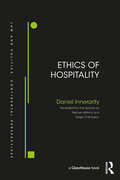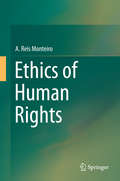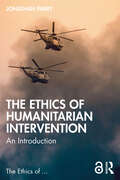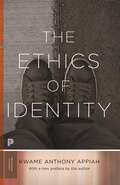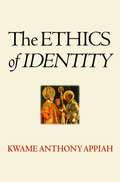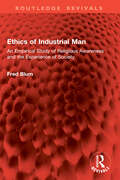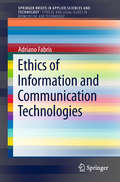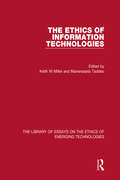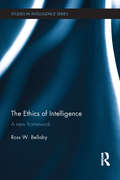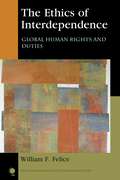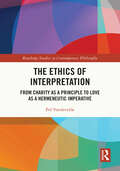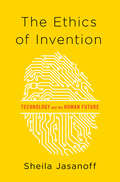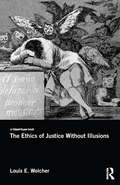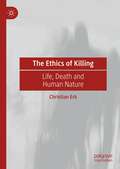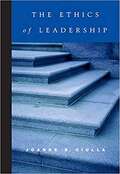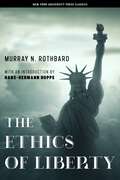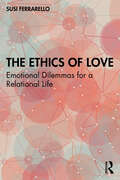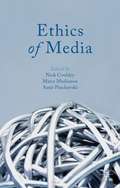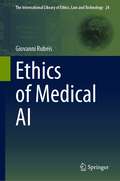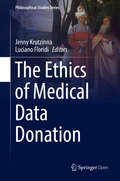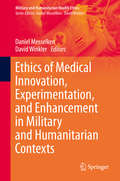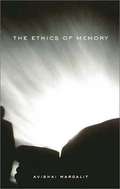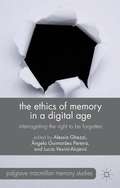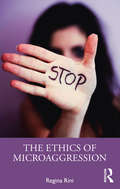- Table View
- List View
Ethics of Hospitality (Law and Politics)
by Daniel InnerarityThe source of hospitality lies in the fundamental ethical experiences that make up the fabric of the social lives of people. Therein lies a primary form of humanity. Whether we are guests or hosts, this reveals our situation in a world made up of receiving and meeting, leaving room for the liberty to give and receive beyond the imperatives of reciprocity. This book proposes an ethic that promotes the possibility of stirring emotion before that of protecting ourselves from unexpected encounters. Fundamental ethical competence consists of opening up to the wholly other and to others, to be accessible to the world’s solicitations. There is moral superiority of vulnerable love over control and moderation, of generous passion over rational prudence and of excess over exchange. Constructing an ethic of hospitality is essential at a time when we are torn between the imperatives of modernization and growth and the demands of concern and protection. The experience we all have today, that of the fragility of the world, is giving rise to a powerful tendency toward solicitude. From such a perspective, the duty of individuals no longer consists of protecting themselves from society, but of defending it, taking care of a social fabric outside of which no identity can be formed.
Ethics of Human Rights
by A. Reis MonteiroThis volume focuses on the ethical significance of human rights, aiming at contributing to a universal culture of human rights with deep roots and wide horizons. Its purpose, scope and rationale are reflected in the three-part structure of the manuscript. Part I has a broad introductory historical, theoretical and legal character. Part II submits that an Ethics of Human Rights is best understood as an Ethics of Recognition of human worth, dignity and rights. Moreover, it is argued that human worth consists in the perfectibility of the human species, rooted in its semiotic nature, to be accomplished through the perfecting of human beings, for which the right to education is key. In Part III, the main legal and political outcomes of the Human Rights Revolution are described and answers to the most lasting and common criticisms of human rights are provided. To conclude, the human stature of the Big Five drafters of the Universal Declaration of Human Rights is profiled and the priority that should be recognized to human rights education is highlighted. Some appendices supplement the manuscript. While making a case for the high value and liberating power of the idea and ideal of human rights, objections, controversies and uncertainties are not at all overlooked and emerging issues are explored. The diversity of content of this volume meets many needs of the typical syllabus for a human rights course.
The Ethics of Humanitarian Intervention: An Introduction (The Ethics of ...)
by Jonathan ParryFew topics generate as much controversy and debate as armed humanitarian intervention. Military force involves death and destruction, as well as interfering in other countries’ domestic affairs. But, crucially, non-intervention is also controversial. When confronted with humanitarian crises abroad, many feel that outsiders are not only justified in using force to halt the abuses, but that they must do so. The Ethics of Humanitarian Intervention: An Introduction offers a guide to these ethical debates.In clear and informative style Jonathan Parry explores the following topics: The morality of defending others, including the ‘responsibility to protect’ (R2P). State sovereignty and self-determination as barriers to intervention. The possibility of consensual intervention. Just causes for intervention: what kinds of human rights abuses warrant intervention? The effectiveness of intervention: does it work in practice? Alternatives to intervention, including aiding rebels, economic sanctions, and providing aid. Whether there is a duty to intervene. Examples of intervention – including the former Yugoslavia, Iraq, Liberia, and Libya – are used to illustrate the ethical dilemmas in question. The arguments of important theorists of intervention, such as John Stuart Mill, Michael Walzer and Jeff McMahan, are also explained clearly and critically. Each chapter concludes with questions for discussion and reflection. The Ethics of Humanitarian Intervention: An Introduction is ideal reading for students and researchers in philosophy, applied ethics, politics and international relations.Chapter 3 of this book is freely available as a downloadable Open Access PDF at http://www.taylorfrancis.com under a Creative Commons Attribution (CC-BY) 4.0 license.
The Ethics of Identity (Princeton Classics #132)
by Kwame Anthony AppiahA bold vision of liberal humanism for navigating today’s complex world of growing identity politics and rising nationalismCollective identities such as race, nationality, religion, gender, and sexuality clamor for recognition and respect, sometimes at the expense of other things we value. To what extent do they constrain our freedom, and to what extent do they enable our individuality? Is diversity of value in itself? Has the rhetoric of human rights been overstretched? Kwame Anthony Appiah draws on thinkers through the ages and across the globe to explore such questions, developing an account of ethics that connects moral obligations with collective allegiances and that takes aim at clichés and received ideas about identity. This classic book takes seriously both the claims of individuality—the task of making a life—and the claims of identity, these large and often abstract social categories through which we define ourselves.
The Ethics of Identity (Princeton Classics Ser. #132)
by Kwame Anthony AppiahRace, ethnicity, nationality, religion, gender, sexuality: in the past couple of decades, a great deal of attention has been paid to such collective identities. They clamor for recognition and respect, sometimes at the expense of other things we value. But to what extent do "identities" constrain our freedom, our ability to make an individual life, and to what extent do they enable our individuality? In this beautifully written work, renowned philosopher and African Studies scholar Kwame Anthony Appiah draws on thinkers through the ages and across the globe to explore such questions.The Ethics of Identity takes seriously both the claims of individuality—the task of making a life—and the claims of identity, these large and often abstract social categories through which we define ourselves.What sort of life one should lead is a subject that has preoccupied moral and political thinkers from Aristotle to Mill. Here, Appiah develops an account of ethics, in just this venerable sense—but an account that connects moral obligations with collective allegiances, our individuality with our identities. As he observes, the question who we are has always been linked to the question what we are.Adopting a broadly interdisciplinary perspective, Appiah takes aim at the clichés and received ideas amid which talk of identity so often founders. Is "culture" a good? For that matter, does the concept of culture really explain anything? Is diversity of value in itself? Are moral obligations the only kind there are? Has the rhetoric of "human rights" been overstretched? In the end, Appiah's arguments make it harder to think of the world as divided between the West and the Rest; between locals and cosmopolitans; between Us and Them. The result is a new vision of liberal humanism—one that can accommodate the vagaries and variety that make us human.
Ethics of Industrial Man: An Empirical Study of Religious Awareness and the Experience of Society (Routledge Revivals)
by Fred BlumHow do people actually experience God, Jesus Christ, the Kingdom and the Church? Does this experience affect their awareness of capitalism, socialism, competition, the relationship of markets to men, and their participation in politics? Does modern man have an ethical concern?First published in 1970, Ethics of Industrial Man explores the interrelationship between people’s experience of a deeper reality of life, their awareness of society and their participation in it. It is usually assumed that religion has lost its impact on the daily life of man. This is true, inasmuch as most people live their working lives divorced from religiously grounded ethics. But the author shows that it ceases to be true if we explore the significance of the universal ground in which all religious awareness and every social order is rooted. Using intensive interviews in Great Britain and the United States over a number of years, the author gives empirical evidence that the ethical impulse is not absent but is thwarted by the absence of bridges between the socio-economic sphere of life and people’s ethical awareness. Decisive in this connection is the confusion between what is universal and what is historically specific. This confusion, the author believes, underlies the apathy, the sense of powerlessness, the prevalence of a false consciousness, the decline of traditional religious forms. It is, he concludes, the core of the ethical corrosion of our time.
Ethics of Information and Communication Technologies (SpringerBriefs in Applied Sciences and Technology)
by Adriano FabrisThis book discusses key ethical and deontological problems concerning the use of the most common information and communication devices. It focuses on the challenges of the new environments we now find ourselves in thanks to these technologies, and the issues arising from the newly established relationship between the virtual sphere and the real world. Each aspect is analysed by starting from a very specific example or a case study presenting a dilemma that can only be resolved by making a reasoned ethical choice. Rather than thematically addressing only one of the many aspects mentioned above (for example, computer ethics or social network ethics), the book presents a comprehensive introduction to, and a co-ordinated overview of, the various deontological and ethical issues regarding the spread of the most common information and communication technologies.
The Ethics of Information Technologies (The\library Of Essays On The Ethics Of Emerging Technologies Ser.)
by Keith MillerThis volume collects key influential papers that have animated the debate about information computer ethics over the past three decades, covering issues such as privacy, online trust, anonymity, values sensitive design, machine ethics, professional conduct and moral responsibility of software developers. These previously published articles have set the tone of the discussion and bringing them together here in one volume provides lecturers and students with a one-stop resource with which to navigate the debate.
The Ethics of Insurgency
by Michael L. GrossAs insurgencies rage, a burning question remains: how should insurgents fight technologically superior state armies? Commentators rarely ask this question because the catchphrase 'we fight by the rules, but they don't' is nearly axiomatic. But truly, are all forms of guerrilla warfare equally reprehensible? Can we think cogently about just guerrilla warfare? May guerrilla tactics such as laying improvised explosive devices (IEDs), assassinating informers, using human shields, seizing prisoners of war, conducting cyber strikes against civilians, manipulating the media, looting resources, or using nonviolence to provoke violence prove acceptable under the changing norms of contemporary warfare? The short answer is 'yes', but modern guerrilla warfare requires a great deal of qualification, explanation, and argumentation before it joins the repertoire of acceptable military behavior. Not all insurgents fight justly, but guerrilla tactics and strategies are also not always the heinous practices that state powers often portray them to be.
The Ethics of Intelligence: A new framework (Studies in Intelligence)
by Ross W. BellabyThis book starts from the proposition that the field of intelligence lacks any systematic ethical review, and then develops a framework based on the notion of harm and the establishment of Just Intelligence Principles. As the professional practice of intelligence collection adapts to the changing environment of the twenty-first century, many academic experts and intelligence professionals have called for a coherent ethical framework that outlines exactly when, by what means and to what ends intelligence is justified. Recent controversies, including reports of abuse at Guantanamo Bay and Abu Ghraib, allegations of extraordinary rendition programmes and the ever-increasing pervasiveness of the ‘surveillance state’, have all raised concerns regarding the role of intelligence in society. As a result, there is increased debate regarding the question of whether or not intelligence collection can be carried out ethically. The Ethics of Intelligence tackles this question by creating an ethical framework specifically designed for intelligence that is capable of outlining under what circumstances, if any, different intelligence collection activities are ethically permissible. The book examines three of the main collection disciplines in the field of intelligence studies: imagery intelligence, signals intelligence and human intelligence. By applying the ethical framework established at the beginning of the book to these three important intelligence collection disciplines, it is possible to better understand the ethical framework while also demonstrating its real-life applicability. This book will be of much interest to students of intelligence studies, ethics, war and conflict studies, security studies and IR.
The Ethics of Interdependence: Global Human Rights and Duties
by William FeliceIn this powerful book, William F. Felice argues that a new range of human rights duties for individuals, nation states, and global institutions has emerged in our modern interconnected era. He investigates the compelling ideas of ethical interdependence and new global human rights duties in four case studies: mass incarceration in the United States, LGBT rights in Africa, women’s rights in Saudi Arabia, and environmental rights in China. Felice argues that in all four cases a “human-rights threshold” has been surpassed, and urgent action is needed to address unacceptable levels of human suffering. <p><p> Beginning with a primer on how the international community through the United Nations has codified international human rights law, Felice explores the conflicts between rights, problems of compliance, and the difficulties that emerge when cultural and religious rights are privileged over the rights of individuals and groups. He shows that a robust normative framework of global governance and global citizenship is central to the actualization of human rights protection for all.
The Ethics of Interpretation: From Charity as a Principle to Love as a Hermeneutic Imperative (Routledge Studies in Contemporary Philosophy)
by Pol VandeveldeThis book discusses the ethical dimension of the interpretation of texts and events. Its purpose is not to address the neutrality or ideological biases of interpreters, but rather to discuss the underlying issue of the intervention of interpreters into the process of interpretation. The author calls this intervention the "ethical" aspect of interpretation and argues that interpreters are neither neutral nor necessarily activists. He examines three models of interpretation, all of which recognize the role that interpreters play in the process of interpretation. In these models, the question of the truth or validity of interpretation is dependent upon the attitude of interpreters. These three models are: (1) the principle of charity in interpretation in the two different versions defended by Hans-Georg Gadamer and Donald Davidson; (2) the production of truth, as developed by Paul Ricoeur and Michel Foucault; and (3) the regulative principle in interpretation as formal validity claims—as presented by Karl-Otto Apel and Jürgen Habermas—and as benevolence or love as an epistemic virtue—as defended by Friedrich Schlegel and Friedrich Schleiermacher. The critical discussion of these three models, which brings to the fore the different manners in which interpreters intervene in the process of interpretation as persons, lays the foundations for an ethics of interpretation. The Ethics of Interpretation will be of interest to scholars and advanced students working in hermeneutics, 19th- and 20th-century philosophy, literary theory, and cultural theory.
The Ethics of Invention: Technology and the Human Future
by Sheila JasanoffWe live in a world increasingly governed by technology--but to what end? Technology rules us as much as laws do. It shapes the legal, social, and ethical environments in which we act. Every time we cross a street, drive a car, or go to the doctor, we submit to the silent power of technology. Yet, much of the time, the influence of technology on our lives goes unchallenged by citizens and our elected representatives. In The Ethics of Invention, renowned scholar Sheila Jasanoff dissects the ways in which we delegate power to technological systems and asks how we might regain control. Our embrace of novel technological pathways, Jasanoff shows, leads to a complex interplay among technology, ethics, and human rights. Inventions like pesticides or GMOs can reduce hunger but can also cause unexpected harm to people and the environment. Often, as in the case of CFCs creating a hole in the ozone layer, it takes decades before we even realize that any damage has been done. Advances in biotechnology, from GMOs to gene editing, have given us tools to tinker with life itself, leading some to worry that human dignity and even human nature are under threat. But despite many reasons for caution, we continue to march heedlessly into ethically troubled waters. As Jasanoff ranges across these and other themes, she challenges the common assumption that technology is an apolitical and amoral force. Technology, she masterfully demonstrates, can warp the meaning of democracy and citizenship unless we carefully consider how to direct its power rather than let ourselves be shaped by it. The Ethics of Invention makes a bold argument for a future in which societies work together--in open, democratic dialogue--to debate not only the perils but even more the promises of technology.
The Ethics of Justice Without Illusions
by Louis E. WolcherThe founding premise of this book is that the nimbus of prestige, which once surrounded the idea of justice, has now been dimmed to such a degree that it is no longer sufficient to secure the possibility of a good conscience for those who undertake, in good faith, to make the world a better place in the spheres of politics and law. The many decent human beings who have noticed and experienced this diminishment of justice’s prestige find themselves in a thoroughly disenchanted existential situation. For them, the attempt to do justice without the illusion of being grounded in something beyond the sheer facticity of their own performances is a distinctly ethical theme, which cries out to be investigated in its own right. Heeding the cry, this book asks and attempts to answer the following fundamental ethical question: is a life in the law – even one spent in the pursuit of justice – worth living, and if so, how can a disenchanted person come to bear the living of it without constantly having to engage in self-deception? If Nietzsche is right that living without illusions is impossible for human beings, then the most important ethical implication of this essentially anthropological fact goes far beyond the question of what illusions we ought to choose. It must also include the question of whether we should succumb to that most seductive and pernicious of all illusions: namely, the belief that exercising great care and responsibility in choosing our illusions – which we might then call our ‘principles of justice’ – excuses us ethically for what we do to others in their name. The culmination of a 10 year legal-philosophical project, this book will appeal to graduate students, scholars and curious non-academic intellectuals interested in continental philosophy, critical legal theory, postmodern theology, the philosophy of human rights and the study of individual ethics in the context of law.
The Ethics of Killing: Life, Death and Human Nature
by Christian ErkIn this book, Christian Erk examines the ethical (im)permissibility of killing human beings in general and of selected killings in particular, namely suicide, lethal selfdefence, abortion and euthanasia, as well as organ transplantation and assisted suicide. He does so by addressing a range of important ethical questions: What does it mean to act? Of what elements is an action comprised? What is the difference between a good or evil action and a permissible or impermissible action? How can we determine whether an action is good or evil? Is there a moral duty not to kill? Is this duty held by and against all human beings or only persons? What and who is a person? What is human dignity and who has it? What is it that is actually taken when somebody is killed, i.e. what is life? And closely related to that: What and when is death? By integrating the answers to these questions into an argumentative architecture, the book offers a comprehensive exploration of one of the most fundamental questions of mankind: Under which conditions, if any, is killing human beings ethically permissible?
The Ethics Of Leadership
by Joanne B. CiullaThe focus of ETHICS OF LEADERSHIP is the ethical challenges that are distinctive to leaders and leadership. Organized around themes such as power and the public and private morality of leaders, the book explores the ethical issues of leadership in a variety of contexts including, business, NGOs, and government. It integrates material on ethics and leadership from the great Eastern and Western philosophers with leadership literature and case studies. This multi-disciplinary approach helps philosophers and leadership scholars present a fully integrated view of the subject.
The Ethics of Liberty
by Murray N. RothbardThe authoritative text on the libertarian political positionIn recent years, libertarian impulses have increasingly influenced national and economic debates, from welfare reform to efforts to curtail affirmative action. Murray N. Rothbard's classic The Ethics of Liberty stands as one of the most rigorous and philosophically sophisticated expositions of the libertarian political position.Rothbard’s unique argument roots the case for freedom in the concept of natural rights and applies it to a host of practical problems. And while his conclusions are radical—that a social order that strictly adheres to the rights of private property must exclude the institutionalized violence inherent in the state—Rothbard’s applications of libertarian principles prove surprisingly practical for a host of social dilemmas, solutions to which have eluded alternative traditions.The Ethics of Liberty authoritatively established the anarcho-capitalist economic system as the most viable and the only principled option for a social order based on freedom. This classic book’s radical insights are sure to inspire a new generation of readers.
The Ethics of Love: Emotional Dilemmas for a Relational Life
by Susi FerrarelloThis book explores the ethical and psychological dilemmas connected to the lived experiences of love, uniquely proposing an ethical framework that can be applied in loving relationships. The book provides an introduction to the study of ethics, moral psychology, and ancient philosophy. Examining key themes of love, such as unconditional love, romantic love, anger, desperation, and fairness, this book offers the reader a way to exercise and strengthen their personal critical thinking on ethical dilemmas, especially in relation to loving feelings. The author believes that ethics is the heart of love in the same way as logic is the brain of reasoning; we do not need ethics to love but we can love in a much healthier way if we train our ethical skills to love. After laying the theoretical framework for the book, chapters are organized into themes relating to ethical problems and begin with an exemplary piece from Greek and Latin literature. Using these writings as a starting point, Susi Ferrarello discusses whether it is possible to have a sound ethical theory of love, especially in cases relating to justice, despair, and rage, and demonstrates how this framework can be applied in new and established relationships. Filled with case studies throughout, spiritual exercises are listed at the end of chapters to help the reader increase their understanding of love and their ethical choices surrounding emotional dilemmas. This interdisciplinary book is essential reading for undergraduate and graduate students who take classes on ethics, marriage and family therapy, psychology, philosophy, classics, ancient philosophy, and politics, as well as those interested in the ethics of love and emotional decision-making.
Ethics of Media
by Nick Couldry Mirca Madianou Amit PinchevskiEthics of Media reopens the question of media ethics. Taking an exploratory rather than prescriptive approach, an esteemed collection of contributors tackle the diverse areas of moral questioning at work within various broadcasting practices, accommodating the plurality and complexity of present-day ethical challenges posed by the world of media.
Ethics of Medical AI (The International Library of Ethics, Law and Technology #24)
by Giovanni RubeisThis is the first book to provide a coherent overview over the ethical implications of AI-related technologies in medicine. It explores how these technologies transform practices, relationships, and environments in the clinical field. It provides an introduction into ethical issues such as data security and privacy protection, bias and algorithmic fairness, trust and transparency, challenges to the doctor-patient relationship, and new perspectives for informed consent. The book focuses on the transformative impact that technology is having on medicine, and discusses several strategies for dealing with the resulting challenges. It also introduces innovative methods of ethics research for addressing existing desiderata and future challenges. This book is written to inform health care professionals, policy-makers, and researchers in medicine, health sciences, nursing science, social sciences, and ethics, but may also function as a primary textbook for graduate as wellas undergraduate university courses.
The Ethics of Medical Data Donation (Philosophical Studies Series #137)
by Jenny Krutzinna Luciano FloridiThis open access book presents an ethical approach to utilizing personal medical data. It features essays that combine academic argument with practical application of ethical principles. The contributors are experts in ethics and law. They address the challenges in the re-use of medical data of the deceased on a voluntary basis. This pioneering study looks at the many factors involved when individuals and organizations wish to share information for research, policy-making, and humanitarian purposes. Today, it is easy to donate blood or even organs, but it is virtually impossible to donate one’s own medical data. This is seen as ethically unacceptable. Yet, data donation can greatly benefit the welfare of our societies. This collection provides timely interdisciplinary research on biomedical big data. Topics include the ethics of data donation, the legal and regulatory challenges, and the current and future collaborations. Readers will learn about the ethical and regulatory challenges associated with medical data donations. They will also better understand the special nature of using deceased data for research purposes with regard to ethical principles of autonomy, beneficence, and justice. In addition, the contributors identify the key governance issues of such a scheme. The essays also look at what we can learn in terms of best practice from existing medical data schemes.
Ethics of Medical Innovation, Experimentation, and Enhancement in Military and Humanitarian Contexts (Military and Humanitarian Health Ethics)
by Daniel Messelken David WinklerThis book discusses ethical questions surrounding research and innovation in military and humanitarian contexts. It focuses on human enhancement in the military. Recently, the availability of medical enhancement designed to make soldiers more capable of surviving during conflict, as well as enabling them to defeat their enemies, has emerged. Innovation and medical research in military and humanitarian contexts may thus yield positive effects, but simultaneously leads to a number of highly problematic ethical issues. The work contains contributions on medical ethics that take into account the specific roles and obligations of military and humanitarian health care providers and the ethical problems they encounter. They cover different aspects of research and innovation such as vaccine development, medical enhancement, compassionate and experimental drug use, research and application of new technologies such as wearables, “Humanitarian innovation” to cope with scarce resources, Biometrics, big data, etc.The book is of interest and importance to researchers and policy makers involved with human enhancement, medical research, and innovation in military and humanitarian missions.
The Ethics of Memory
by Avishai MargalitMuch of the intense current interest in collective memory concerns the politics of memory. In a book that asks, "Is there an ethics of memory?" Avishai Margalit addresses a separate, perhaps more pressing, set of concerns. <p><p> The idea he pursues is that the past, connecting people to each other, makes possible the kinds of "thick" relations we can call truly ethical. Thick relations, he argues, are those that we have with family and friends, lovers and neighbors, our tribe and our nation--and they are all dependent on shared memories. But we also have "thin" relations with total strangers, people with whom we have nothing in common except our common humanity. A central idea of the ethics of memory is that when radical evil attacks our shared humanity, we ought as human beings to remember the victims.<p> Margalit's work offers a philosophy for our time, when, in the wake of overwhelming atrocities, memory can seem more crippling than liberating, a force more for revenge than for reconciliation. Morally powerful, deeply learned, and elegantly written, The Ethics of Memory draws on the resources of millennia of Western philosophy and religion to provide us with healing ideas that will engage all of us who care about the nature of our relations to others.
The Ethics of Memory in a Digital Age
by Alessia Ghezzi Ângela Guimarães Pereira Lucia Vesnić-AlujevićThis edited volume documents the current reflections on the 'Right to be Forgotten' and the interplay between the value of memory and citizen rights about memory. It provides a comprehensive analysis of problems associated with persistence of memory, the definition of identities (legal and social) and the issues arising for data management.
The Ethics of Microaggression
by Regina RiniSlips of the tongue, unwitting favoritism, and stereotyped assumptions are just some examples of microaggression. Nearly all of us commit microaggressions at some point, even if we don’t intend to. Yet over time a pattern of microaggression can cause considerable harm by reminding members of marginalized groups of their precarious position. The Ethics of Microaggression is a much needed and clearly written exploration of this pervasive yet complex problem. What is microaggression and how do we know when it is occurring? Can we be held responsible for microaggressions and if so, how? How has social media affected the problem? What role can philosophy play in understanding microaggression? Regina Rini explores these highly topical and controversial questions in an engaging and fair-minded way, arguing that an event is a microaggression precisely because it causes a marginalized person to experience an ambiguous encounter with oppression. She illustrates her argument with compelling examples from media, politics, and psychology and explains the significance of essential concepts, such as media representation, reparative renaming, and safe spaces. The Ethics of Microaggression explains what microaggression is and offers strategies for combating it. Assuming no prior knowledge of the topic or philosophy, it demystifies a controversial and extremely important topic in clear language. It is ideal for anyone coming to the topic for the first time and for students in philosophy, gender studies, race theory, disability theory, and social and political philosophy.
